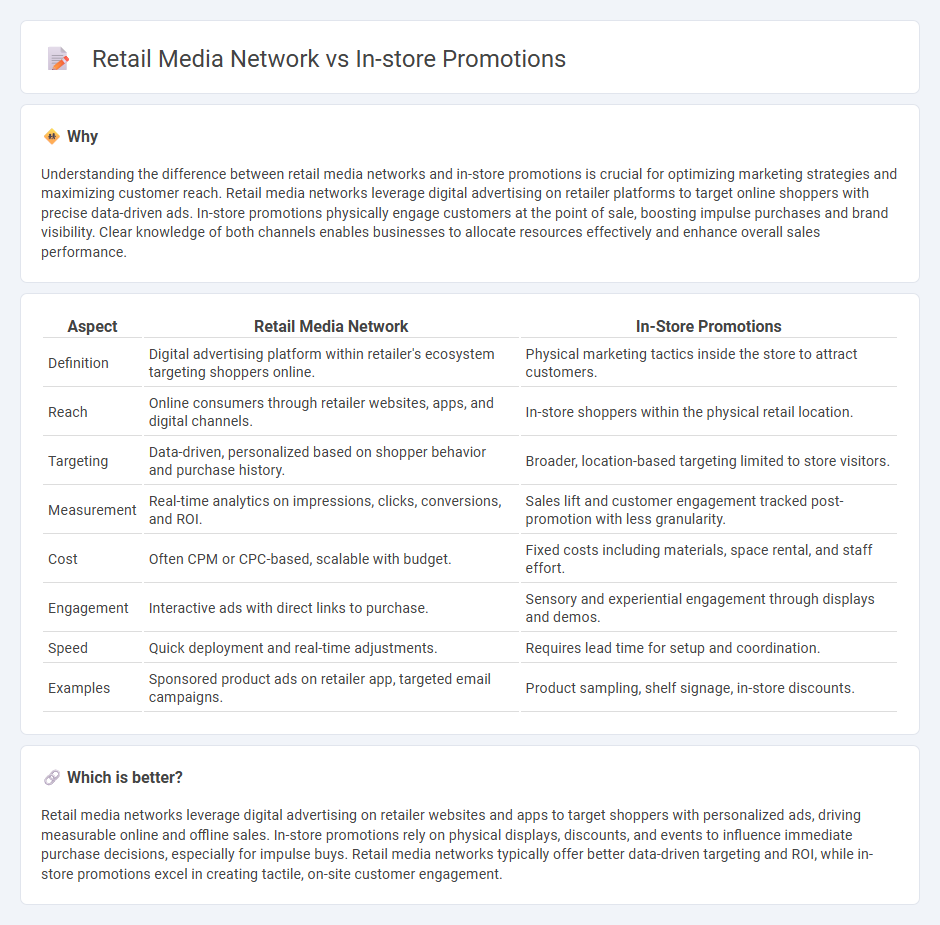
Retail media networks leverage digital platforms to target consumers with personalized advertisements based on browsing and purchase data, enhancing campaign precision and measurable outcomes. In-store promotions focus on physical displays and direct shopper engagement to boost impulse purchases and brand visibility within the retail environment. Explore the advantages and strategies of retail media networks compared to traditional in-store promotions to optimize your marketing efforts.
Why it is important
Understanding the difference between retail media networks and in-store promotions is crucial for optimizing marketing strategies and maximizing customer reach. Retail media networks leverage digital advertising on retailer platforms to target online shoppers with precise data-driven ads. In-store promotions physically engage customers at the point of sale, boosting impulse purchases and brand visibility. Clear knowledge of both channels enables businesses to allocate resources effectively and enhance overall sales performance.
Comparison Table
| Aspect | Retail Media Network | In-Store Promotions |
|---|---|---|
| Definition | Digital advertising platform within retailer's ecosystem targeting shoppers online. | Physical marketing tactics inside the store to attract customers. |
| Reach | Online consumers through retailer websites, apps, and digital channels. | In-store shoppers within the physical retail location. |
| Targeting | Data-driven, personalized based on shopper behavior and purchase history. | Broader, location-based targeting limited to store visitors. |
| Measurement | Real-time analytics on impressions, clicks, conversions, and ROI. | Sales lift and customer engagement tracked post-promotion with less granularity. |
| Cost | Often CPM or CPC-based, scalable with budget. | Fixed costs including materials, space rental, and staff effort. |
| Engagement | Interactive ads with direct links to purchase. | Sensory and experiential engagement through displays and demos. |
| Speed | Quick deployment and real-time adjustments. | Requires lead time for setup and coordination. |
| Examples | Sponsored product ads on retailer app, targeted email campaigns. | Product sampling, shelf signage, in-store discounts. |
Which is better?
Retail media networks leverage digital advertising on retailer websites and apps to target shoppers with personalized ads, driving measurable online and offline sales. In-store promotions rely on physical displays, discounts, and events to influence immediate purchase decisions, especially for impulse buys. Retail media networks typically offer better data-driven targeting and ROI, while in-store promotions excel in creating tactile, on-site customer engagement.
Connection
Retail media networks leverage in-store promotions by integrating digital advertising with physical retail environments, creating a cohesive shopping experience that drives customer engagement and sales. By using shopper data and targeting capabilities, these networks deliver personalized ads that complement in-store discounts and product placements. This synergy enhances brand visibility, boosts conversion rates, and maximizes return on investment for retailers and advertisers.
Key Terms
Point-of-Sale Displays
Point-of-sale (POS) displays serve as a critical tool in in-store promotions, directly influencing consumer purchasing behavior through strategic product placement and eye-catching designs. Retail media networks extend this impact by integrating digital advertising with physical POS displays, enabling data-driven targeting and real-time measurement of campaign effectiveness. Explore how combining in-store promotions with retail media networks can optimize shopper engagement and sales performance.
Digital Ad Placements
In-store promotions leverage physical displays and experiential marketing to drive immediate purchasing decisions, while retail media networks utilize digital ad placements targeting shoppers across e-commerce platforms with data-driven precision. Retail media networks maximize ROI through personalized ads based on consumer behavior and purchase history, offering scalability beyond the physical store environment. Explore how combining these strategies can enhance brand visibility and sales performance.
Shopper Data Analytics
Shopper data analytics in retail media networks leverage digital insights from multiple touchpoints, enabling highly targeted in-store promotions based on precise consumer behavior and preferences. In-store promotions traditionally rely on broader, less granular data such as sales volume and foot traffic, limiting their personalization and effectiveness compared to the real-time analytics provided by retail media platforms. Explore how integrating shopper data analytics transforms promotional strategies and drives measurable ROI by visiting our detailed analysis.
Source and External Links
5 In-Store Promotions Every Marketer Should Know - Hummingbirds - In-store promotions like flash sales, BOGOs, influencer partnerships, and free gifts effectively boost in-person retail sales by creating urgency and encouraging impulse purchases, illustrated by Macy's frequent flash sales offering limited-time discounts across departments.
In-store promotions - (Honors Marketing) - Fiveable - In-store promotions are marketing tactics that increase customer engagement and sales by offering temporary discounts, special deals, or eye-catching displays designed to enhance the shopping experience within physical retail spaces.
Retail Promotion Ideas: Maximizing Customer Engagement in 2025 - Retailers use innovative in-store promotions such as exclusive discounts for BOPIS (Buy Online, Pick Up In-Store), free gifts, loyalty point bonuses, and influencer-driven campaigns to increase foot traffic, encourage hybrid shopping, and blend social commerce into the retail environment.
 dowidth.com
dowidth.com